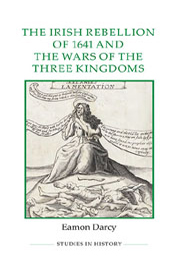Book contents
- Frontmatter
- Contents
- Acknowledgements
- Abbreviations
- Introduction
- 1 Representing violence and empire: Ireland and the wider world
- 2 Imagined violence? The outbreak of the 1641 rebellion in Ireland
- 3 Manufacturing massacre: the 1641 depositions and the Wars of the Three Kingdoms
- 4 The 1641 rebellion and violence in the New and Old Worlds
- 5 Contesting the 1641 rebellion
- Conclusion: The 1641 rebellion in its British, European and Atlantic world context
- Bibliography
- Index
5 - Contesting the 1641 rebellion
Published online by Cambridge University Press: 05 May 2013
- Frontmatter
- Contents
- Acknowledgements
- Abbreviations
- Introduction
- 1 Representing violence and empire: Ireland and the wider world
- 2 Imagined violence? The outbreak of the 1641 rebellion in Ireland
- 3 Manufacturing massacre: the 1641 depositions and the Wars of the Three Kingdoms
- 4 The 1641 rebellion and violence in the New and Old Worlds
- 5 Contesting the 1641 rebellion
- Conclusion: The 1641 rebellion in its British, European and Atlantic world context
- Bibliography
- Index
Summary
Throughout the course of the war, combatants referred back to the outbreak of rebellion and contested its nature. Accounts of rebel violence justified the use of excessive force by English and Scottish armies in Ireland in 1642 and again in 1649. After the successful conquest of Ireland by Oliver Cromwell, histories of 1641 appeared to remind authorities of what Irish Protestants had suffered during the previous decade. The establishment of the Cromwellian regime in Ireland provided an opportunity radically to alter the Irish political landscape. Histories of the 1641 rebellion played a key role in these debates: combatants in the Wars of the Three Kingdoms manipulated the past in order to defend their actions or to lobby Oliver Cromwell to pursue various policies in Ireland. This led to the confiscation of land and transplantation of entire communities, which drastically changed the social order in early modern Ireland. Recent work by Kevin McKenny has shown that over the course of the 1650s and 1660s the percentage of land held by Catholics fell from 66 per cent to 29 per cent, while Protestant land holdings increased from 30 per cent to 67 per cent. Upon the restoration of Charles ii in May 1660, many Catholics hoped that they would regain their lost estates as a reward for their loyalty to the Stuarts during the 1640s. Once again the spectre of 1641 reared its head and became a subtext to debates on whether Catholics should be restored to the lands that they had enjoyed prior to the rebellion.
- Type
- Chapter
- Information
- The Irish Rebellion of 1641 and the Wars of the Three Kingdoms , pp. 132 - 167Publisher: Boydell & BrewerPrint publication year: 2013



